

Vloeibare basiszeep - 100% natuurlijk - Zonnebloem & Kokos - Biologisch - GGB08 (1 liter = € 6,95) Wat is een cookie?

Een cookie is een klein tekstbestand dat bij je bezoek aan een website naar je computer wordt gestuurd. Zowel deze website als andere partijen kunnen cookies plaatsen. Waar worden cookies voor gebruikt? Deze website gebruikt cookies om het gebruiksgemak en de prestaties van de website te verbeteren. MOOCs and Beyond. MOOC et e-learning, quelles différences ? 9 nouveaux MOOC pour se former au Web et au numérique - Educavox. MOOCs and Beyond - eLearning Papers 33 released. Guest edited by Dr Yishay Mor, Senior Lecturer at the Open University's Institute of Educational Technology (UK), and Tapio Koskinen, Director of the eLearning Papers Editorial Board, MOOCs and Beyond seeks to both generate debate and present a variety of perspectives about this new popular learning model.
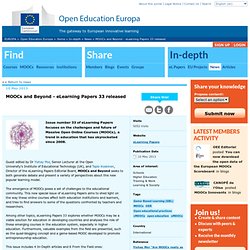
The emergence of MOOCs poses a set of challenges to the educational community. This new special issue of eLearning Papers aims to shed light on the way these online courses affect both education institutions and learners, and tries to find answers to some of the questions confronted by teachers and researchers. Among other topics, eLearning Papers 33 explores whether MOOCs may be a viable solution for education in developing countries and analyses the role of these emerging courses in the education system, especially in higher education.
This issue includes 4 In-Depth articles and 6 From the Field ones: In-depth articles From the field articles. How NOT to Design a MOOC: The Disaster at Coursera and How to Fix it. I don’t usually like to title a post with negative connotations, but there is no way to put a positive spin on my experience with the MOOC I’m enrolled in through Coursera, Fundamentals of Online Education: Planning and Application.
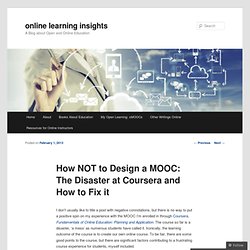
The course so far is a disaster, ‘a mess’ as numerous students have called it. Ironically, the learning outcome of the course is to create our own online course. To be fair, there are some good points to the course, but there are significant factors contributing to a frustrating course experience for students, myself included. Scoop.it: eLearning and Digital Cultures. Mooc mates: flipboard magazine. To MOOC or Not to MOOC - WorldWise. MOOCs have become a media obsession.
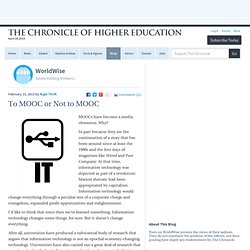
Why? In part because they are the continuation of a story that has been around since at least the 1990s and the first days of magazines like Wired and Fast Company. At that time, information technology was depicted as part of a revolution: Marxist rhetoric had been appropriated by capitalism. Edinburgh's Coursera-based Moocs attract 300,000. University of Leiden offers free online law course via Coursera. Leiden University just became the first Dutch university to offer a Massive Open Online Course (MOOC), entitled "The Law of the European Union: An Introduction," on online learning platform Coursera . Coursera was started about a year ago, and offers hundreds of online courses at top universities. The courses are free, have no entry requirements or preliminary examination, and therefore aim to make high quality education available to anyone with an internet connection.
The course at Leiden will start in May 2013. Over 10.000 people from all over the world have enrolled since it was announced. Essay on how MOOCs raise questions about the definition of student. Clay Shirky and Jay Rosen have popularized the phrase “People Formerly Known as the Audience” to describe the evolution of contemporary media consumers from mere listeners or viewers into interactive and demanding participants.
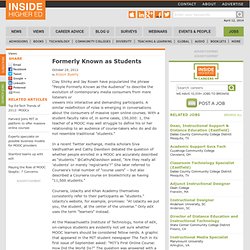
Essay on what MOOCs are missing to truly transform higher education. Here’s a question I’m asked more and more every day: When is Georgia Tech going to offer an undergraduate engineering degree online?
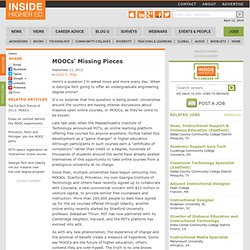
It’s no surprise that this question is being posed. Universities around the country are having intense discussions about massive open online courses, or MOOCs, as they’ve come to be known. Late last year, when the Massachusetts Institute of Technology announced MITx, an online learning platform offering free courses for anyone anywhere, Forbes hailed this development as a "game changer" in higher education. Although participants in such courses earn a "certificate of completion" rather than credit or a degree, hundreds of thousands of students around the world have already availed themselves of this opportunity to take online courses from a prestigious university at no charge.
Since then, multiple universities have begun venturing into MOOCs. How NOT to Design a MOOC: The Disaster at Coursera and How to Fix it. » Napster, Udacity, and the Academy Clay Shirky. Fifteen years ago, a research group called The Fraunhofer Institute announced a new digital format for compressing movie files.
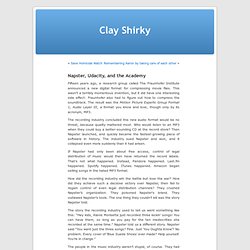
This wasn’t a terribly momentous invention, but it did have one interesting side effect: Fraunhofer also had to figure out how to compress the soundtrack. The result was the Motion Picture Experts Group Format 1, Audio Layer III, a format you know and love, though only by its acronym, MP3. The recording industry concluded this new audio format would be no threat, because quality mattered most.
Who would listen to an MP3 when they could buy a better-sounding CD at the record store? Then Napster launched, and quickly became the fastest-growing piece of software in history. If Napster had only been about free access, control of legal distribution of music would then have returned the record labels. Udacity - Educating the 21st Century.
What is a MOOC? Success in a MOOC. MOOCs – The revolution has begun, says Moody’s. A new report by Moody’s Investors Service suggests that while MOOCs’ exploitation of expanded collaborative networks and technological innovation will benefit higher education in the United States as a whole, their long-term effect on the for-profit sector and smaller not-for-profit institutions could be damaging.
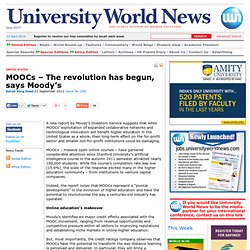
MOOCs – massive open online courses – have garnered considerable attention since Stanford University’s artificial intelligence course in the autumn 2011 semester attracted nearly 160,000 students. While the course’s completion rate was low (15.6%), the scale of the response excited many in the higher education community – from institutions to venture capital companies. Indeed, the report notes that MOOCs represent a “pivotal development” in the evolution of higher education and have the potential to revolutionise the way a centuries-old industry has operated. Sexy MOOCMOOC tools. Massively MOOC.